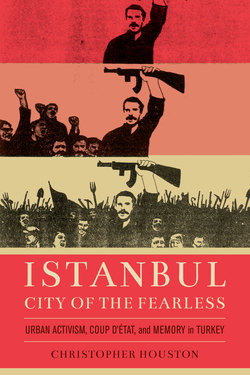Istanbul, City of the Fearless

Реклама. ООО «ЛитРес», ИНН: 7719571260.
Оглавление
Christopher Houston. Istanbul, City of the Fearless
Отрывок из книги
Istanbul, City of the Fearless
Urban Activism, Coup d’État, and Memory in Turkey
.....
Most active in this project is the Turkish Armed Forces, which attributes responsibility for the military intervention to the collective anarchism, terrorism, and class separatism of the militants themselves. In his speech broadcast on State TV and Radio on the morning of the coup, General Kenan Evren drew attention to the “perverted ideologies” that made some people sing the “Internationale” in place of the Turkish national anthem. It is plausible to suggest that denigrating the activists of those years comprised a key policy through which the Turkish military legitimized its preeminent role in post-coup politics. This campaign also ensured the immunity from prosecution of the military personnel responsible for the gross human rights abuses carried out as a matter of regime policy after the coup. It was only thirty years after the intervention, with the junta leaders nearly all deceased, that the Turkish parliament abrogated the constitutional clause granting coup leaders amnesty from prosecution (see chapter 8). At the time of writing, tens of civil court cases have been launched against military personnel. The outcomes of these are uncertain.
In brief, a dominant discourse invokes the increasingly violent polity in the years before the coup as its very justification, binding for better or worse militants and coup-makers to each other. That narrative positions the activists of the late 1970s as the city’s fulcrum generation, negatively but causally linked to the restructuring of Istanbul and of Turkey itself. Activists themselves live with that status, rejecting the implication that they deserved their arrest and torture while reflecting upon the failure of their struggle to transform urban society.6 Indeed my interviews with ex-activists reveal how in retrospect they are intensely critical of the faults and shortcomings of their own groups and factions in the years before the coup (see chapters 2, 4, and 5), a critique, in short, of themselves, as well as an imagining of their own partial responsibility for the present flawed development and state of the city. This sober self-examination informs many ex-activists’ identities and practices in the present.
.....